Public Events
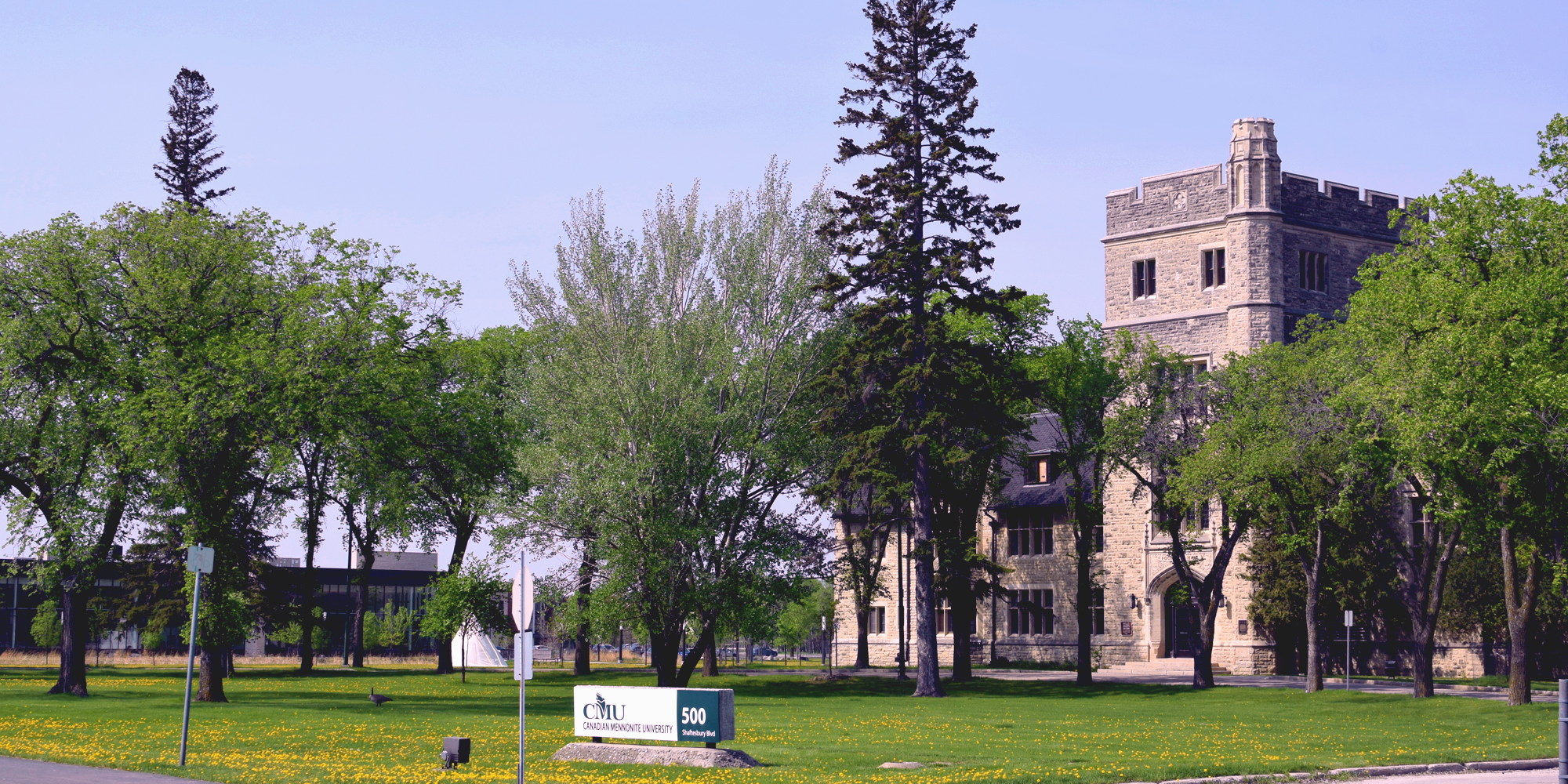
CMU's Face2Face events are a series of conversations with CMU faculty and special guests designed to engage the community on a wide variety of current events and issues at the intersection of faith and life. Come out to listen, question, and discuss.
All Face2Face discussions take place 7:00–8:30 PM in Marpeck Commons (2299 Grant Ave.), unless otherwise stated.
Being Peacemakers in a World of Surging Polarization
Four Essentials for the Christian Journey of Hope
Wednesday, March 11 | 7:00 PM
Marpeck Commons (2299 Grant Ave.) and via livestream
We have found ourselves in an era of ideological silos, where the world trades nuance for shouting matches. As Christians dedicated to fostering social healing and spiritual renewal, we will explore how faith-driven empathy can bridge deep cultural divides. Join us as we navigate these tensions and rediscover the art of reconciliation today.
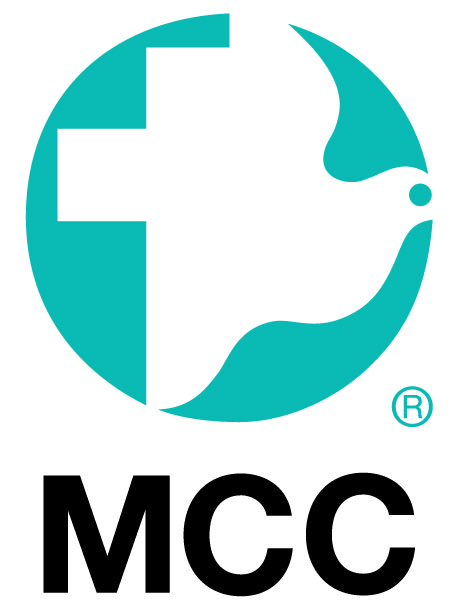 This event is co-presented by MCC Manitoba
This event is co-presented by MCC ManitobaPresenter
- Chris Rice | MCC alumnus, co-founding director of Duke Divinity School Centre for Reconciliation, writer, and global networker
Host
- Darryl Loewen | Executive Director of MCC Manitoba
Panelists
- Dr. Dan Epp-Tiessen | Senior Scholar in Biblical and Theological Studies; Emeritus Associate Professor of Bible
- Dr. Jodi Dueck-Read | Associate Professor of Conflict Resolution Studies and Peace and Conflict Transformation Studies
- Watch the livestream below on Wednesday, March 11 at 7:00 PM -
Past Face2Face Conversations

Anabaptism at 500: Commitment to Scripture
Thursday, February 27 | 7:00 PM
Marpeck Commons (2299 Grant Ave.) and via livestream
From 1525 to 2025, Anabaptists have taken a very personal and community-oriented approach to their embrace of the scriptures. This evening’s conversation will investigate the ways the Bible shaped the 16th century Anabaptist movement at its inception and continues to uniquely define the Anabaptist tradition today. We will also celebrate the Canadian launch of the Anabaptist Community Bible.
This Face2Face event will feature two parts: a panel discussion and the Canadian launch of the Anabaptist Community Bible, presented by CommonWord Bookstore and Resource Centre with CMU and Mennonite Church Canada.

Panel Discussion
Host
- Dr. Brian Froese, Professor of History at CMU
Panelists
- Dr. Paul Doerksen, Associate Professor of Theology and Anabaptist Studies and P.M. Friesen Co-Chair in Biblical and Theological Studies at CMU
- Dr. Sheila Klassen-Wiebe, Associate Professor of New Testament at CMU
- Dr. John Roth, Project Director of MennoMedia’s Anabaptism at 500 and retired Professor of History at Goshen College (1985–2022)
Anabaptist Community Bible Book Launch
Featuring Dr. John Roth who provided editorial oversight to 600 participating groups that contributed to the production of the Anabaptist Community Bible in celebration of 500 years of Anabaptism. Roth will provide an orientation to the Anabaptist Community Bible and a behind-the-scenes look at the making of this unique edition.
Copies of the Anabaptist Community Bible will be available for purchase at CommonWord Bookstore and Resource Centre (order online here).
Let’s Get Dirty: The Lowdown on Earth’s Fabric in your own Yard
Tuesday, April 16 | 7:00 PM
Marpeck Commons (2299 Grant Ave.) and via livestream
From Zimbabwe to Winnipeg, science has uncovered the potential that lies within the soil. From nutrient-rich food production to life-saving antibiotics, learn how the dirt in the fields and in your own yard can be harnessed to make our world a better, healthier place. Hear from scientists, researchers, conservationists, and farmers as they unearth the impact we can all make on local and global communities.
Participants
- Rachel Krause – Associate Professor of Biology, CMU
- John Brubacher – Associate Professor of Biology, CMU
- Heather Unger – Permaculture Researcher and Designer
- Megan Klassen-Wiebe – CSA Farmer, Metanoia Farmer Cooperative
- Scott Gerbrandt – Director, A Rocha Manitoba
Host
- Evan Balzer – Conservation Engagement Coordinator at Nature Conservancy of Canada
This Event is Generated by Artificial Intelligence:
Conversations with ChatGPT
November 15 | 7:00 PM
Marpeck Commons (2299 Grant Ave.) and via livestream
You are invited to a gamified opportunity learn and gain a deeper understanding of the uses, opportunities, and ethical concerns of generative AI’s role in our rapidly changing world. Whether you are a student interested in AI’s capabilities, a teacher exploring its pedagogical potential, an administrator investigating workplace applications, or a member of the community who is simply curious, this event is for all!
We’re literally going to chat with ChatGPT! Participants will demonstrate how to use AI, share personal and professional insights into using AI, discuss how AI can complement human reasoning and enrich human experiences and capabilities, and provide considerations for using AI responsibly.
Join us for a fun and thought-provoking evening.
interview: cHVN
Host
- Chloe Friesen (CMU ’21, Communications & Media) | Associate Producer & Radio Technician, CBC
Participants
- ChatGPT (Chat Generative Pre-trained Transformer) | Large language model-based chatbot developed by OpenAI
- Dr. Jodi Dueck-Read | Director of Research and Program Grants & Assistant Professor of Conflict Resolution Studies, CMU
- Shannon Richard | Software Developer and Team Lead, Laiv.ly
- Daniel McIntyre-Ridd (CMU '20, Communications & Media) | Supervisor, NATA Reforestation and Management
- Dr. Tim Rogalsky | Associate Professor of Mathematics, CMU
- Qaisar Roonjha (CMU ‘23, MA–Peacebuilding and Collaborative Development) | Cofounder of Wang Lab of Innovation (WALI) & Cofounder of Urdu AI, Pakistan's first AI learning platform in Urdu
Polarization: Get over it! Stories that lead the way
⇒ Monday, February 27, 2023 | 7:00 PM (CST)
[ CMU news release ]
[ winnipeg free press story ]
[ the carillon story ]
Polarization is a state in which the opinions, beliefs, or interests of a group or society no longer range along a continuum but become concentrated at opposing extremes (Merriam-Webster). This dynamic is increasingly becoming the norm in our society, in our churches, even in our families.
It’s time to get over it. Let’s have a conversation about what we can be do to transcend extreme difference and work towards harmony.
Guest panelists will share examples and stories of how they’ve overcome polarization in big and small ways in their various contexts.
Join us for an engaging, imaginative, and hope-filled evening of community conversation.
Panelists
- Hon. Kelvin Goertzen MLA (Progressive Conservative) – Minister of Justice
- Dougald Lamont MLA (Liberal) – Leader of the Manitoba Liberal Party
- Jamie Moses MLA (NDP) – Critic for Economic Development and Training
- Jayme Menzies – Policy Analyst (Assembly of Manitoba Chiefs) and Athletics Coach (CMU)
Moderator
- Dr. Jodi Dueck-Read – Assistant Professor of Conflict Resolution Studies
Naawi-Oodena: A Town Hall Conversation
⇒ Saturday, September 24, 2022 | 7:00 PM (CDT)
[ news release ]
Naawi-Oodena, a landmark project on the site of the former Kapyong Barracks, aspires to be the pride of Winnipeg and the rest of Canada, showcasing the best in Indigenous business, design, arts, and culture for generations to come. In 2021, the Treaty One Nations (T1N) named the property Naawi-Oodena, which means “centre of the heart and community” in the Anishinaabe language.
Located just down the road from the CMU campus, this development represents the largest multi-use project in modern Winnipeg history and the single largest, strategically located urban Indigenous economic zone in Canada. It has the potential to shape Winnipeg’s future urban growth, generate significant economic investment, and connect communities.
Join us for a presentation by Naawi-Oodena leadership, a look at their 3D model and app, and for conversation/Q&A with CMU President Cheryl Pauls moderating.
Participants from Naawi-Oodena
- Jolene Mercer – Director of Governance, Treaty One Nation
- Whelan Sutherland – CEO, Treaty One Nation
- Tim Daniels – Chief Development Officer, Treaty One Nation
- Chief Gordon BlueSky – Chief of Brokenhead Ojibway Nation and Chairperson, Treaty One Nation
- Dave Thomas – Planning and Design Manager, Treaty One Nation

Watch the livestream below on September 24 at 7:00 PM (CDT)
Who cares? The elderly among us...
⇒ Wednesday, February 24, 2021 | 7:00 PM (CST)
COVID-19 is shining a light on our assumptions about the elderly among us. The pandemic has exposed cracks in our systems of care, revealing how we value the presence of older adults in our communities. In this experience, light is being shed on our understandings of aging, family, and community. We are led to wonder...
- How might we listen anew to the voice and resilience of older adults? How could such listening reshape our imagination and understanding?
- What insights do Indigenous communities offer about the valuing of elders?
- Can we learn to care for older adults and ourselves in ways that open fuller, life-giving possibilities?
- To what vision of reciprocal elder-care are our communities and churches being called?
Panel
- Moderator
- Heather Campbell-Enns, CMU Assistant Professor of Psychology
- Panelists
- Gary Ledoux, Executive Director at Bethania Personal Care Home
- Barbara and Clarence Nepinak, Indigenous Elders
- Rosalie Loeppky and Walter Wiebe, Seniors
From Violence to Peace: Stories can change the world
⇒ Winnipeg: Wednesday, November 18, 2020 | 8:00 PM (CST)
⇒ Manila: Thursday, November 19, 2020 | 10:00 AM
In a world struggling to achieve peace, 16 CMU peacebuilding students have been joined by 11 peacebuilding practitioners from the Philippines to create a space for mutual learning and exchange. Together these 27 student-practitioners are learning to build positive change in their lives and in their vastly differing communities. Together they are sharing stories and through them opening hearts and minds to new possibilities of peace in our world.
Join in a conversation with a panel drawn from this Peace and Conflict Transformation Studies class and engage stories of Indigenous, African, Filipino, and Canadian peacebuilders who are working to:
- Build trust, and share convictions and questions on peace and violence
- Bring together active practitioners with current peacebuilding theories
- Live into a unique CMU and the Mindanao Peacebuilding Institute (Philippines) partnership
- Open opportunities to resource, support and mentor one another
Enter into personal and collective stories of violence and peace, and experience the significance of storytelling as an essential tool of peacebuilding. Strengthen your own vision for how we can all make a difference in our world.
Join a panel conversation with:
- CMU Students
- Pamela Obonde (Kenya)
- Bryna Link (Peguis First Nation)
- Mindanao Peacebuilding Institute Students
- Anzanoor Bubong
- Ailyn Barrios
Co-moderated by CMU's Dr. Wendy Kroeker and Mike Frank Alar of the Mindanao Peacebuilding Institute.
Pandemic brings together students in Canada and Philippines
Seeing Through the Pandemic: The Art of Noticing
⇒ Thursday, September 24, 2020
COVID-19 focuses our daily attention on physical distancing, sanitization and hygiene, masks, ventilation systems, maximum space capacities, infection, testing, self-isolation...and more. At times, COVID-19 leaves us feeling anxious and forces us to confront life's fragility. COVID-19 also invites us to think about what we notice and how we see.
Can this pandemic experience also open us to more than what we have lost? What ways of seeing do various fields of scholarship afford? How might a multi-disciplinary conversation provide perspective, sharper focus, and new understanding during this challenging time?
Join a panel conversation with a CMU...
- Music Therapist
- Sociologist
- Biologist
- Philosopher-Theologian
Moderated by Kenton Lobe – Instructor, International Development and Environmental Studies
Us and Them: How did we become so polarized?
⇒ Monday, February 10, 2020
[ news release ]
Increasingly, public discourse is characterized by divisions between people and groups who see and understand the world differently. It is common for us to witness polarized speech played out in political spheres, in cultural 'us and them' assumptions, in urban-rural divides, and in the life of the church. This dynamic exerts a powerful effect on many of us, whatever our political or theological stripe. Building relationships of meaning and trust amongst people who see our world through vastly different lenses feels increasingly rare. This Face2Face conversation will seek to renew the importance of healthy public and churchly discourse and help us reimagine the role of listening, dialogue, patience, and bridge-building with those with whom we differ.
Key Questions
- What is your experience with 'polarized discourse' and how has it impacted you, or persons, groups or communities with which you connect?
- How did we get here? What perspectives do you bring about why polarization so frequently characterizes our discourse? What has led our communities, our broader society and our churches to this place?
- Do you see particular factors at play in our cultural, political, religious or personal lives – ie. leaders, technology / social media, isolation from people and communities other than ourselves? Is this a 'pendulum problem' which will correct itself over time, or are we facing a challenge of another sort? What in your mind has led us to where we are?
- What do you hope for? Is it possible to hold and be true to particular 'positions' and be expansive in our engagement with those who hold other positions? Where might we go and how might we walk in a different trajectory? What picture might we imagine that points us to a better way?
Panel
- Larry Updike
- A former radio host (CJOB Morning Show; as well as God Talk; CBC afternoon host) with years of advocacy on behalf of various social service agencies, Larry has worked hard to bring disparate voices to a common table. Larry served as a sessional instructor in the CMU Communications and Media program a number of years ago.
- Will Braun
- Will is a farmer living near Morden who has worked with MCC, Geez magazine, and with northern Indigenous peoples living with hydropower projects. He writes for Canadian Mennonite magazine and is the creator of Once Around the Barn. Will's op-ed in the Winnipeg Free Press 'Firing Cherry a missed opportunity' injected a unique perspective into the conversation into which Canadians were drawn.
- Sandy Koop-Harder
- Sandy is a professional mediator and a partner and business manager for Facilitated Solutions. Sandy holds an MBA and CMed and has decades of experience in mediation training and Alternative Dispute Resolution. She will speak out of her personal / professional experience. Sandy also presently serves as Vice-Chair of the CMU Board of Governors.
- Marnie Klassen
- A fourth year Social Theology Student at CMU, hailing from Abbotsford, BC, Marine has danced along denominational edges and divides throughout her life, and is interested in empathy, dialogue, and collaboration between so-called "liberals" and "conservatives." She is currently working on a qualitative research project addressing those labels and the call to love one's neighbour.
Moderator
- Paul Doerksen
- Associate Professor with strong interest in this issue
Whose Neighbour Am I? Treaty One and Mennonite Privilegium
⇒ Wednesday, October 10, 2018
[ news release ]
The stories of Indigenous and Mennonite peoples are woven into larger Canadian settlement movements, even as our experiences have been vastly different.
The early 1870's witnessed agreements with the government of Canada for both people groups. In August, 1871, Treaty 1—the first of seven signed Treaties—was signed between Canada and the Anishinabek and Swampy Cree of southern Manitoba, appropriating land from Indigenous peoples in return for reserved land and opening a basis for assimilation into Canadian society.
In July, 1873 a 'Privilegium' was signed between the government of Canada and Mennonites living in Russia with the offer of significant land reserves, freedom of religion, exemption from military service and an opening for entry into Canadian society.
How might a conversation to better understand these agreements with Indigenous and Mennonite peoples in Manitoba open us to live better together?
Key Questions
What do we need to better understand about our Indigenous and Mennonite stories?
- What were the Indigenous, Mennonite, and government understandings of what the Treaty and the Privilegium imagined?
- What understandings do each of these people groups bring to these agreements and to the stories that have unfolded since then?
- What context, narratives and myths regarding each of these agreements would be helpful to broaden our understanding?
- How might we have a conversation about what our mutual understandings of land were in the early 1870's?
Where does this leave us now?
- What are the questions opened by these historical realities?
- Given all that we now know, if we could turn the clock back to 1871 or 1873, what—if anything—might we do differently?
- How might Mennonites reimagine the story of 1873 in order to live better together now with their Indigenous neighbours?
- How have we honoured—and failed to honour—these early covenants? Where are we now?
- What does it mean to 'share the land,' a central concept of Treaty 1—especially in light of all that has occurred since 1871? How do rural and urban perspectives uniquely shape responses to this question? Where does hope lie?
Panelists
- Indigenous Representative: Niigaanwewidam James Sinclair, Assistant Professor in Native Studies, University of Manitoba, and a columnist for the Winnipeg Free Press; and
- Mennonite Representative: Hans Werner, Associate Professor in History (retired), University of Winnipeg
Moderator
- Dr. Wendy Kroeker, Assistant Professor, Peace and Conflict Transformation Studies; Academic Director, Canadian School of Peacebuilding
Whose Neighbour Am I? Newcomers in Canada
⇒ Wednesday, November 7, 2018
Ours is a world in which millions of people flee danger and seek the possibility of new beginnings in lands and cultures foreign to their upbringing. Ours is also a world beset by various 'tribalisms' and perceptions of 'the other' whose presence for some feels unsettling. In Canada, a land of plenty, we have been gifted by, and have much to learn from the many newcomers and asylum seekers who now live, work, and study with and among us. Join in a conversation that will challenge and enrich our understanding of the neighbours that we are as we seek to foster understanding of our shared humanity.
Key Questions
- What has been the migration experience of individuals from many places around the world who have settled in Canada?
- What does it mean to call this new land 'home'?
- What urban/rural, economic, social, political, and cultural realities, and challenges have been encountered?
- How and where has support been found?
- How have these realities shaped and reshaped them?
- How might a fuller understanding of the experience of newcomers from many places around the world shape understandings and actions?
- How do newcomers' experiences redefine how generational Canadians see themselves—and how together do we understand who we are together as new and generational Canadians? How has this enriched or changed the sense of the word 'welcome'?
- What is the reality that 'they may not be who we think they are'?
- Where is there hope?
Panel Members
- Daniella Mirimba (Congo)
- Jean-Marie Munyaka (Congo)
- Reem Younes (Syria)
- Nestory Niyonkuru (Burundi)
- Jamileh Naso (Iraq)
- Anie Sanchez (Colombia)
Moderator
- Arisnel Mesidor (Migration & Resettlement Program Coordinator, Mennonite Central Committee )
Let's Talk about Death...it won't kill you
⇒ Monday, February 11, 2019
We are often fearful of, or even repelled by, conversations about death or being in the presence of death—a reality that we and our culture tend to outsource to professionals whose job it is to cleanse and package death in sanitized ways. At the same time, our culture seems to be drawn to ghoulish obsessions involving death.
How do we make sense of these fears and obsessions?
Join a conversation with a casket maker, spiritual care provider, Death Café participant, and expert in film culture. This conversation will open insights on how we talk about and confront a reality that each of us will encounter, and empower us to live with renewed depth.
Panelists
- Casket and Urn Maker – Rick Zerbe Cornelsen
- Spiritual Health Practitioner – Doug Koop
- Death Café Participant – Angelika Jantz
- Assoc. Professor of English and Film Studies – Michael Boyce
The conversation will be moderated by David Balzer, Assistant Professor of Communications and Media.


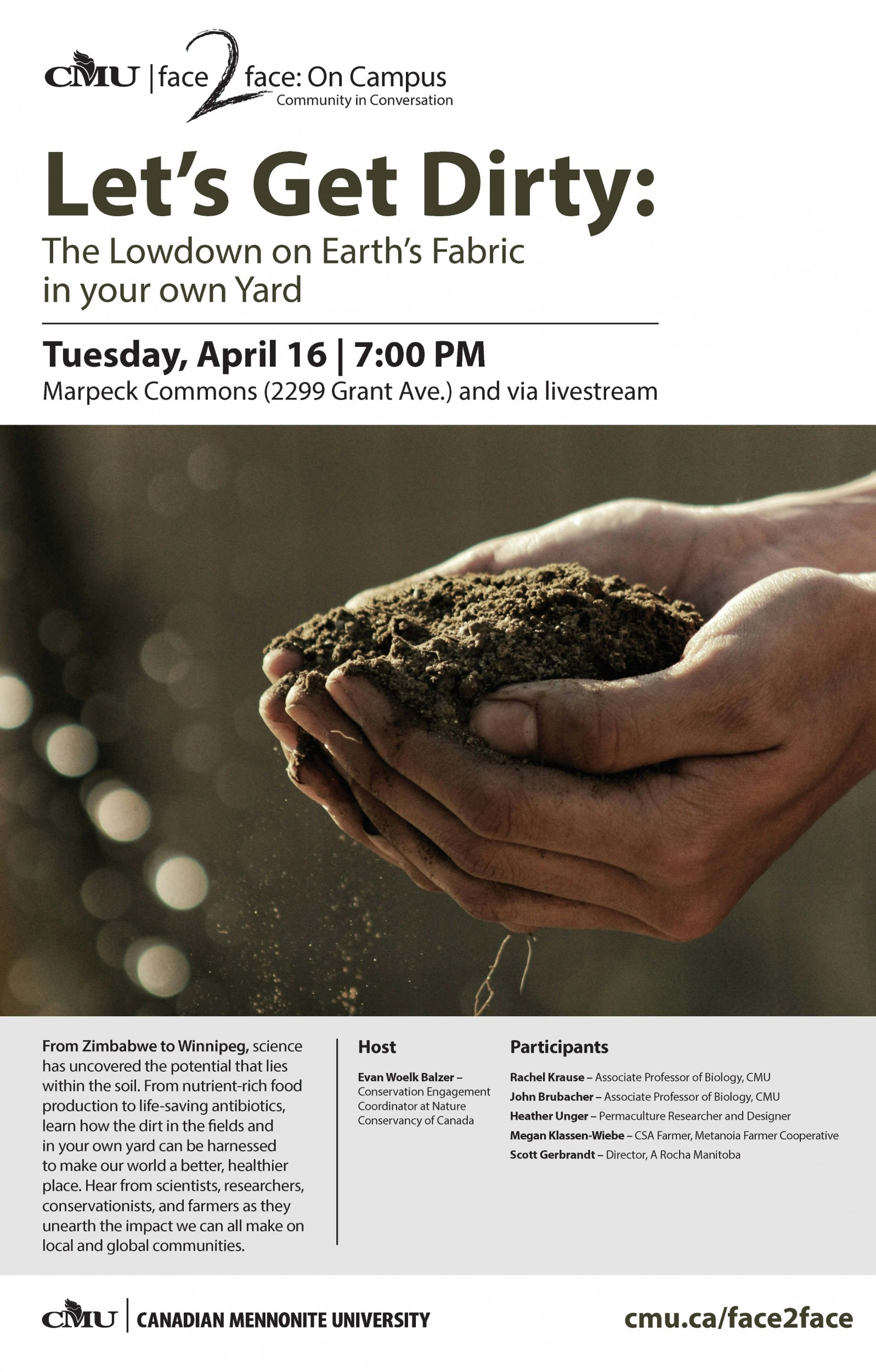
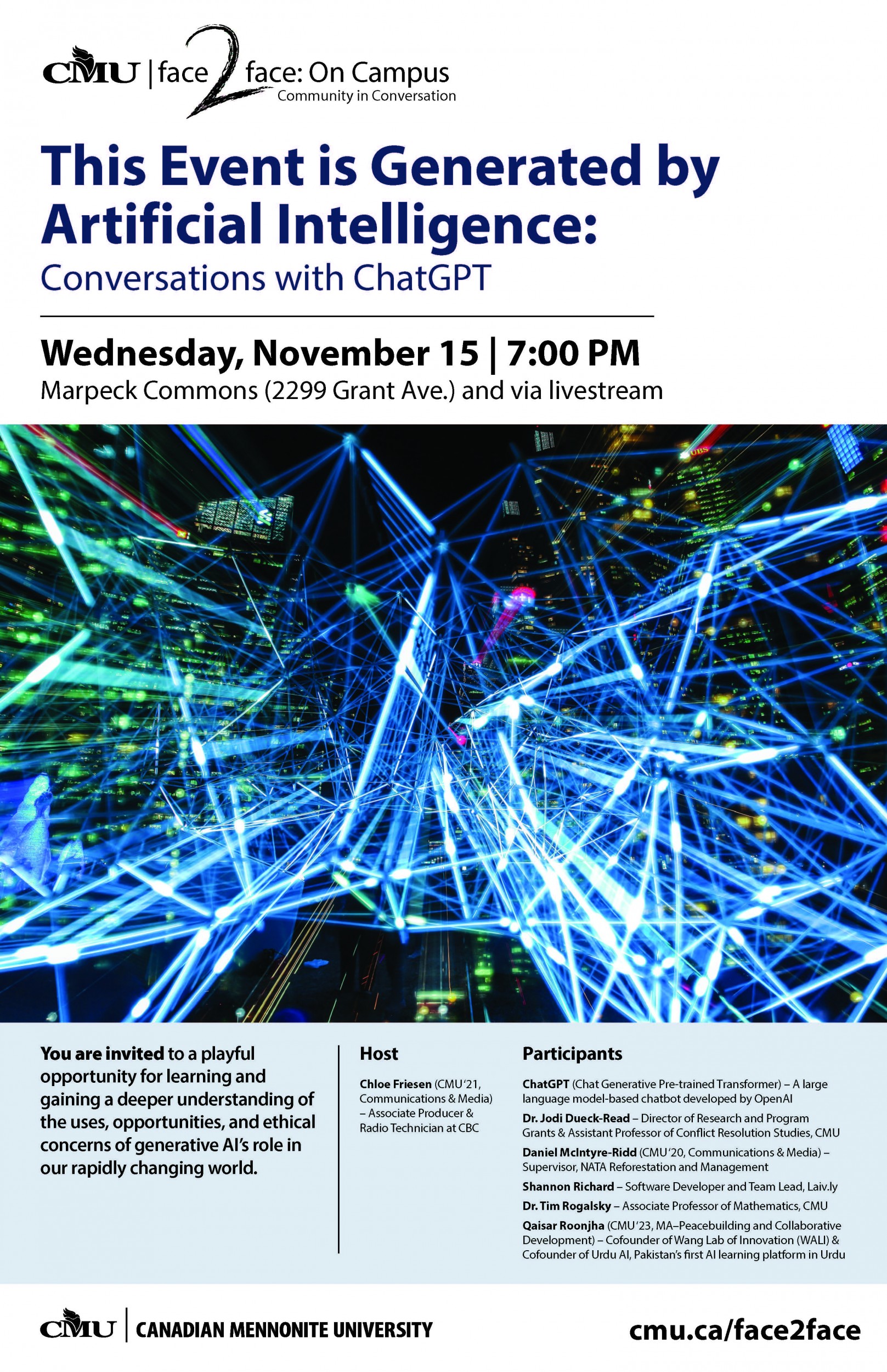
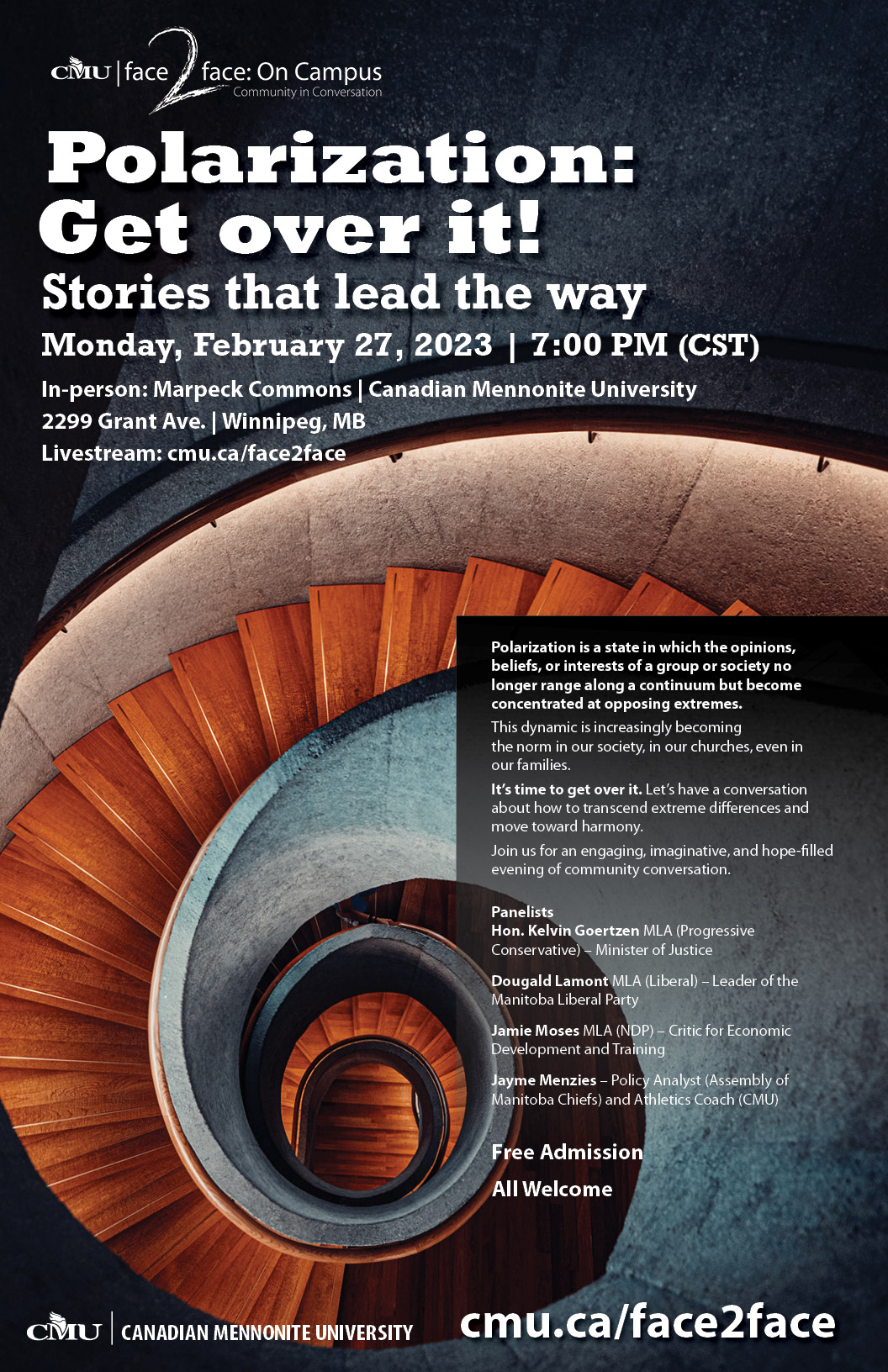









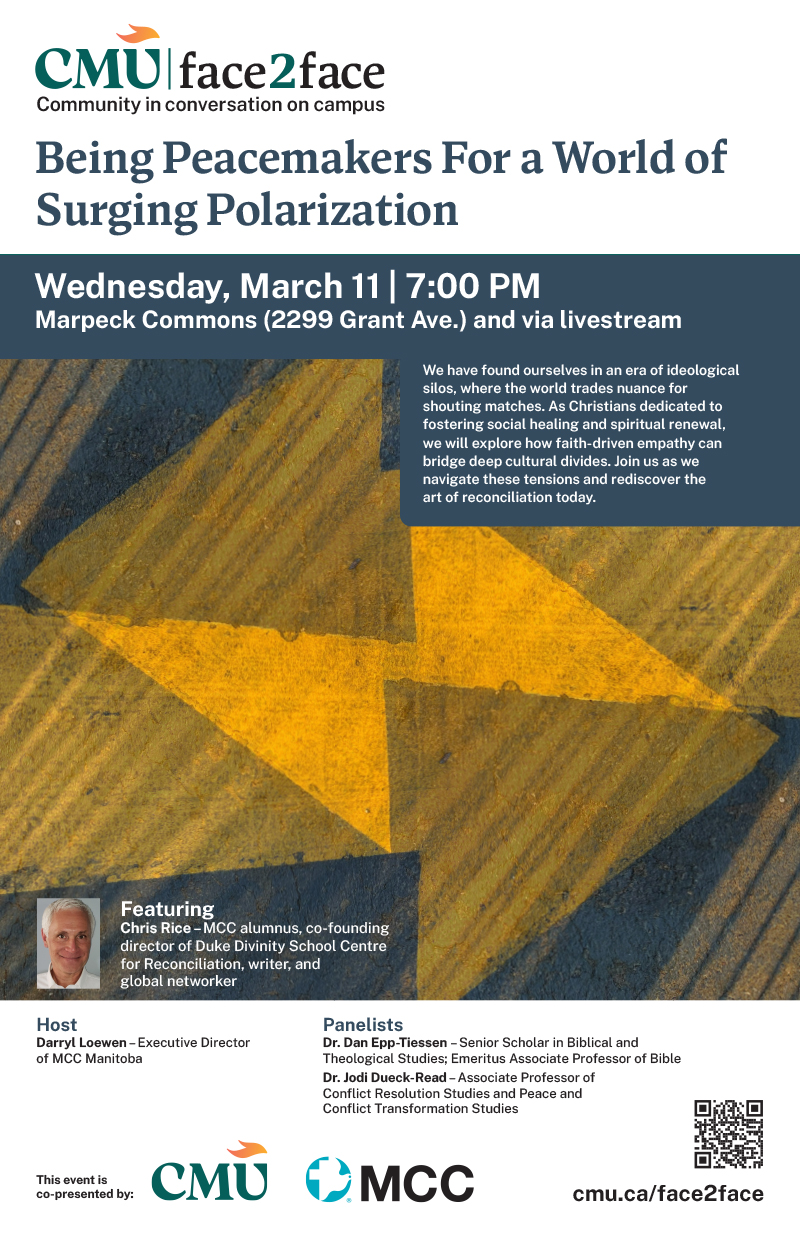
 Print This Page
Print This Page